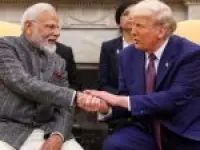
(image/kashmers.com)
The centuries-old Kashmiri carpet industry is facing a serious threat as US tariffs on global imports – introduced under the Trump administration – begin to affect artisans, traders, and exporters in the region. Though aimed primarily at large exporters like China, the tariffs are expected to inadvertently disrupt traditional handwoven crafts, including Kashmir’s famed silk and wool carpets.
Thousands of Kashmiri families rely on the craft for their livelihood, but the 28 per cent tariff on Indian carpets entering the US has made these luxury items significantly more expensive for American retailers and consumers. This price increase has not translated into higher wages for artisans – instead, it has led to cancelled orders, reduced income, and growing uncertainty for those keeping the tradition alive.
Also Read | Kashmir’s Own ‘Red Gold’ And The Burrowing Threat Beneath It
Mohammad Yousuf Dar, 50, and his wife, Shameema, 43, are among the few remaining artisans in Srinagar, Kashmir’s capital. They spend months weaving a single carpet by hand using traditional patterns passed down through generations. “I spend months knotting a single rug, but if there is no demand, our skills feel worthless,” Mohammad told Al Jazeera. He is now the only weaver left in his neighbourhood, where over 100 others abandoned the trade two decades ago.
While the couple continues to work by lamplight, referring to an ancient, coded pattern known as Taleem, their future is increasingly uncertain. Shameema said she supports her husband in the hope of maintaining a basic income. “I just help my husband so that we have a modicum of decent income to run our household,” she said.
Carpet exports from India to the US are valued at about $1 billion annually, half of the global $2 billion market. However, rising prices due to tariffs are pushing international buyers toward cheaper, machine-made alternatives, leaving traditional artisans struggling to compete.
Wilayat Ali, a carpet supplier in Srinagar, confirmed that his export partner has already cancelled at least a dozen orders and returned finished carpets. “It boils down to the hard arithmetic of profit and loss. They do not see thousands of knots in a carpet that takes months to make,” he said, as quoted by Al Jazeera.
Also Read | US-China Trade War: Beijing Says It Will Ignore Washington’s ‘Tariff Numbers Game’
Despite enduring decades of regional conflict between India and Pakistan, changing market trends, and the rise of mass production, the Kashmiri carpet industry now faces one of its most serious challenges. Without international trade policies that protect traditional crafts, experts warn the region’s hand-knotted carpet legacy may soon unravel entirely.













